

Lunar Lander Beyond was provided by ATARI for review. Thank you!
ATARI has been on a roll recently. Their decision to take their older, classic titles and remaster or remake them has breathed new life into their long-dormant series, which is a joy. Lunar Lander is the next game to get this treatment, a massive difference from the original. I first heard about Lunar Lander Beyond at Gamescom last year and finally got to see it in person and try it for myself at GDC and PAX East. I have been playing it on my own, and I can say that developer Dreams Uncorporated found a fantastic way to change the formula without changing the core that makes Lunar Lander what it is.
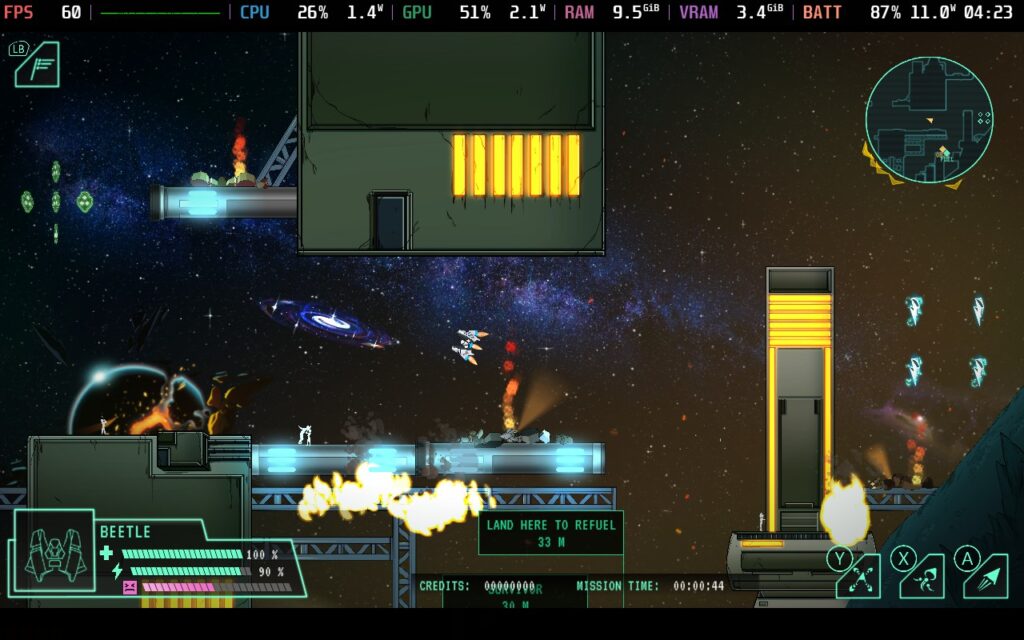
Like the old games, the goal of each level is to guide and land your spaceship on a platform. While this was all it was about before, Lunar Lander Beyond expands on this by having you complete missions where you will have to navigate different planets and buildings, rescue survivors, hack terminals, and, of course, land safely on platforms. You must strategically and carefully use your thrusters and guide your ship through different obstacles.
Lunar Lander Beyond introduces some new gameplay elements that randomize events to keep things unique. As you play, you will get new pilots with specific traits that can modify your ship's handling, like increasing acceleration or extra ship armor. They can also level up to get new traits. There are also four different ships that all handle a bit differently, and you can customize each ship with different abilities. Utilizing these can help you find the right combination to make your ship handle best for your style of gameplay.
But, my favorite new addition is easily the stress system. Whenever you get hit or knocked into a wall, you will experience stress, augmenting the level. If you get too much stress, random eyes, mouths, and even purple elephants will appear out of nowhere. These don't directly harm your ship, but they can make focusing on navigating significantly harder. And, if you get too much, you can go insane and blow up.
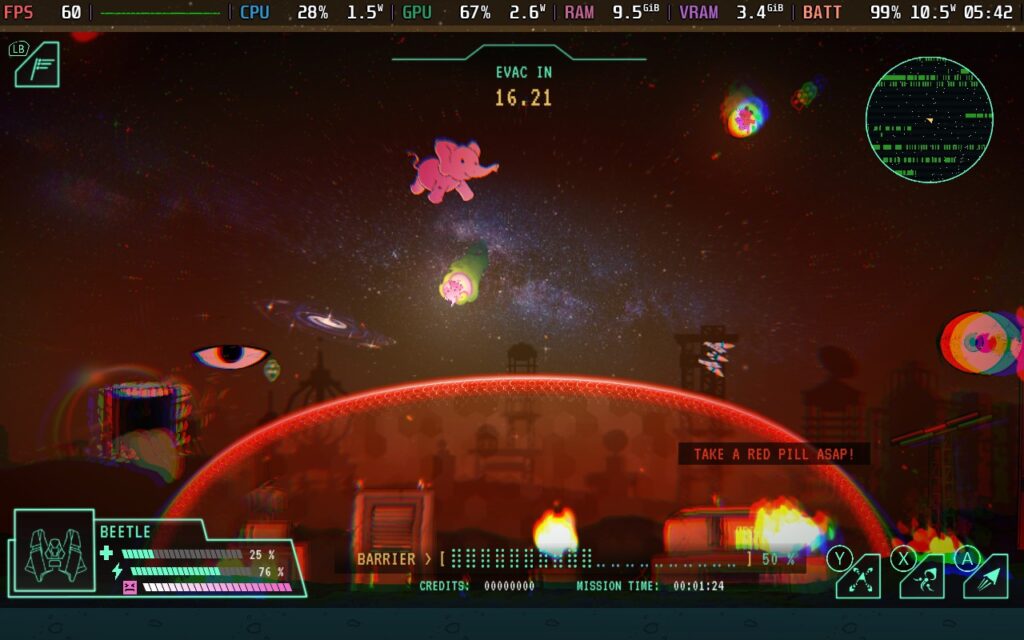
Lunar Lander is known for being extremely hard due to how ridiculous it was to control the ship. With Lunar Lander Beyond, it has become a lot more accessible to control, making it a much easier experience overall. The stress system is a nice way to add difficulty back in an intriguing way, and I love it.
The story that was added is quite interesting too. You will play through 30 different missions across 5 planets and do what you can to discover the cause of a massive shockwave that has opened up tons of black holes. There are some expected twists and turns, but overall, it is a more fascinating story than I would expect of a game like this. Each planet and mission are quite varied, giving different gorgeous visual and mechanical experiences that keep gameplay appealing.
There were a couple of missions that aggravated me more than others, like the last mission on the first planet, where you have to ram yourself into meteors to protect the people below you. I also didn't find much of a reason to come back in and continue playing once the campaign was beaten. You can go back in and try to master and complete each level as fast as possible and try to get new randomized pilots, but that wasn't enough to bring me back. There are four different difficulty settings that you can replay with, but with the procedurally generated pilots and attributes, I would have loved to see some form of an endless mode where we just go mission to mission, trying to buff up our pilot as much as possible, but there aren't any gameplay modes or online leaderboards outside of the campaign.
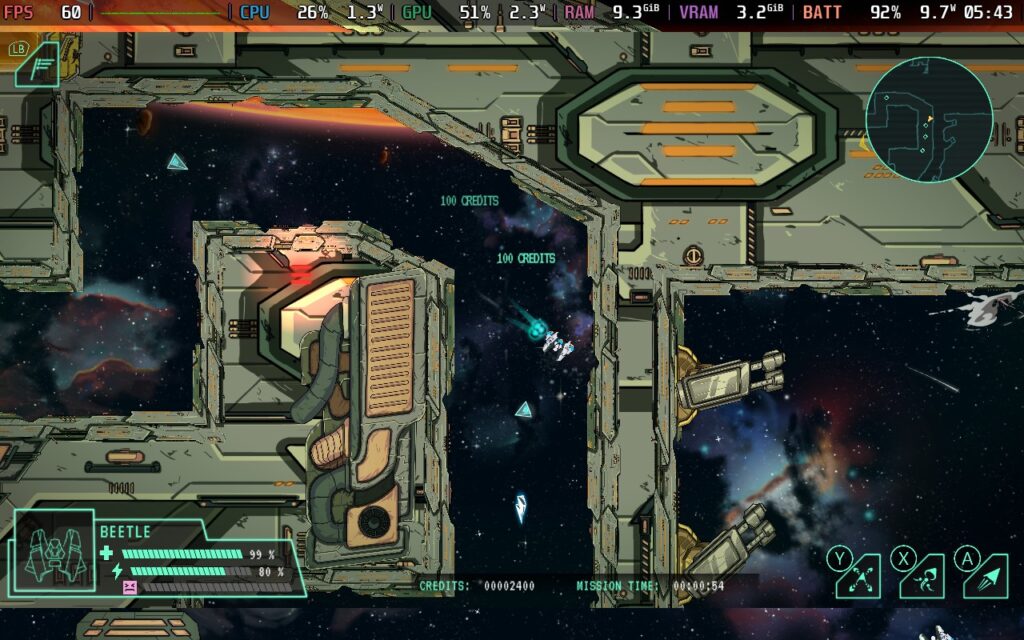
Regardless, it is a pleasure to play on the Steam Deck.
Lunar Lander Beyond is not an intensive game, and it is a great game to play on the Steam Deck, though it has a couple of quirks. It can hit 90 FPS, but I did notice that in some stages, there would be slight instability and drops to 88 FPS, which can feel like there is some stuttering. Due to this, I would recommend setting the framerate to 60. This makes the game feel significantly smoother overall and reduces the battery drain to around 10W - 11W.
I also noticed that some of the cutscenes/animated videos do have crackly audio and tend to drain batter significantly more than the main game. Without a limit, the drain could go up to 15W, while I almost never saw in-game battery drain go above 11.5W. Since this doesn't happen for long, I would say keeping the TDP limit off is okay, but it's still worth mentioning.
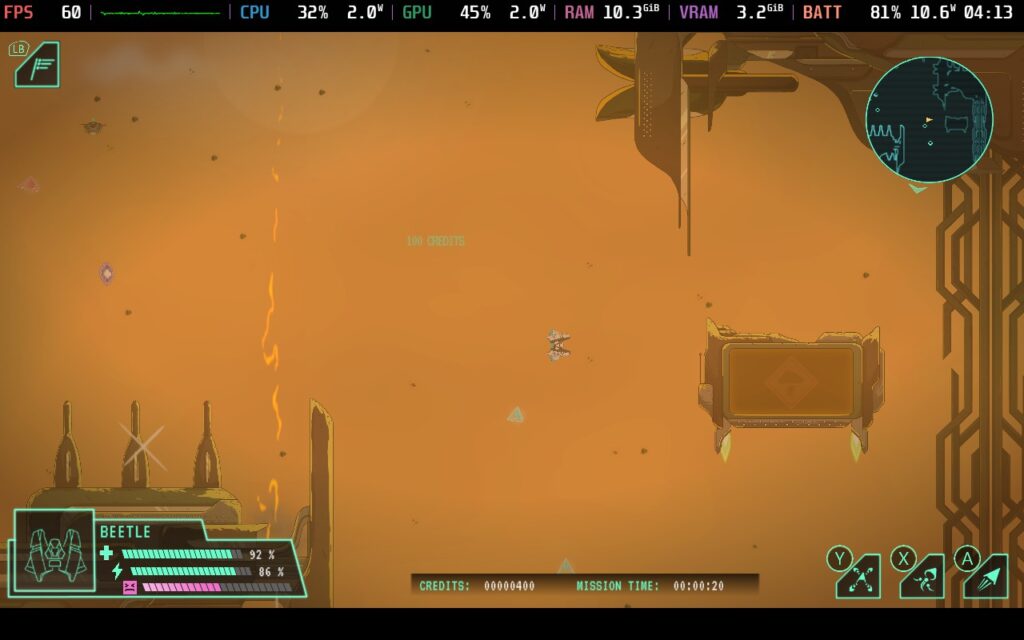
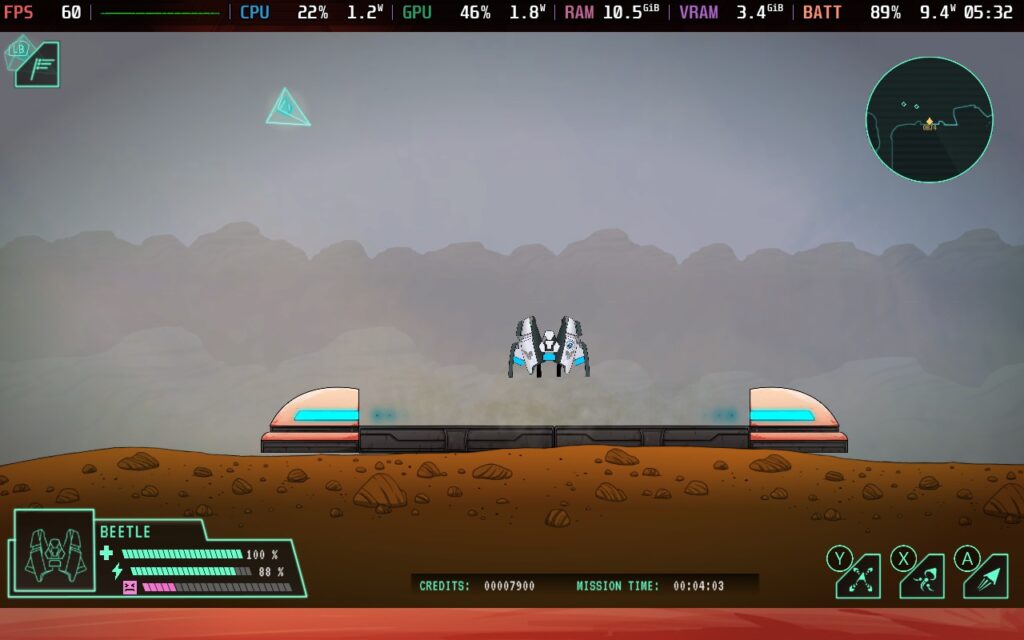
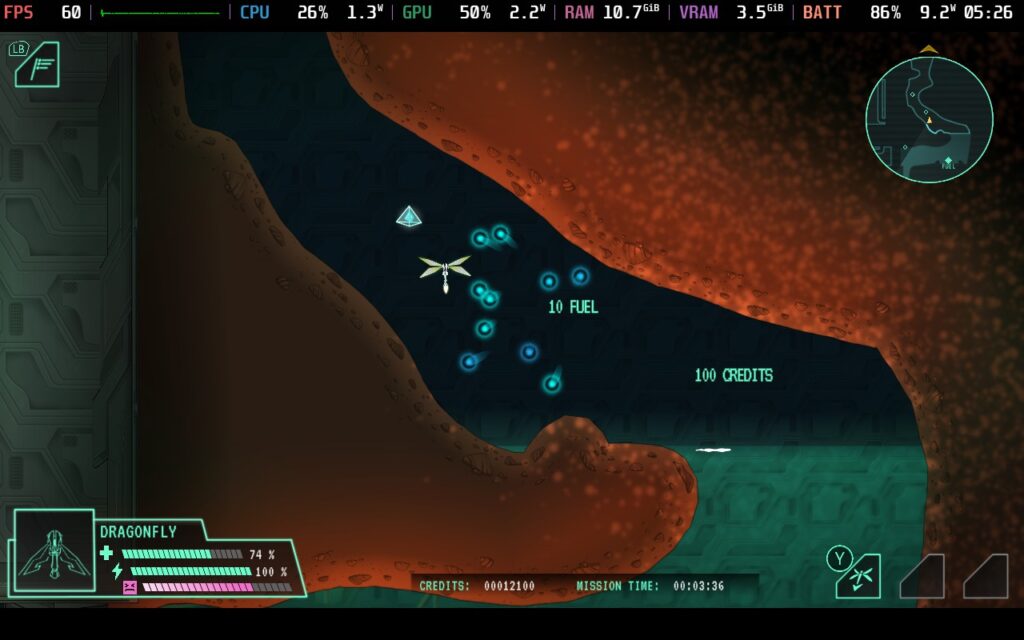
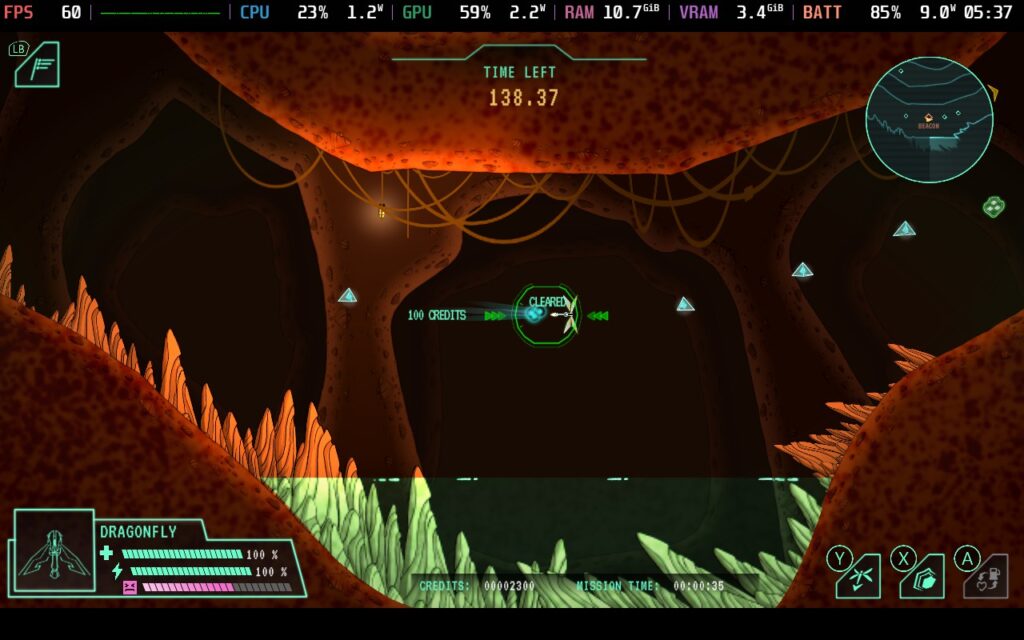
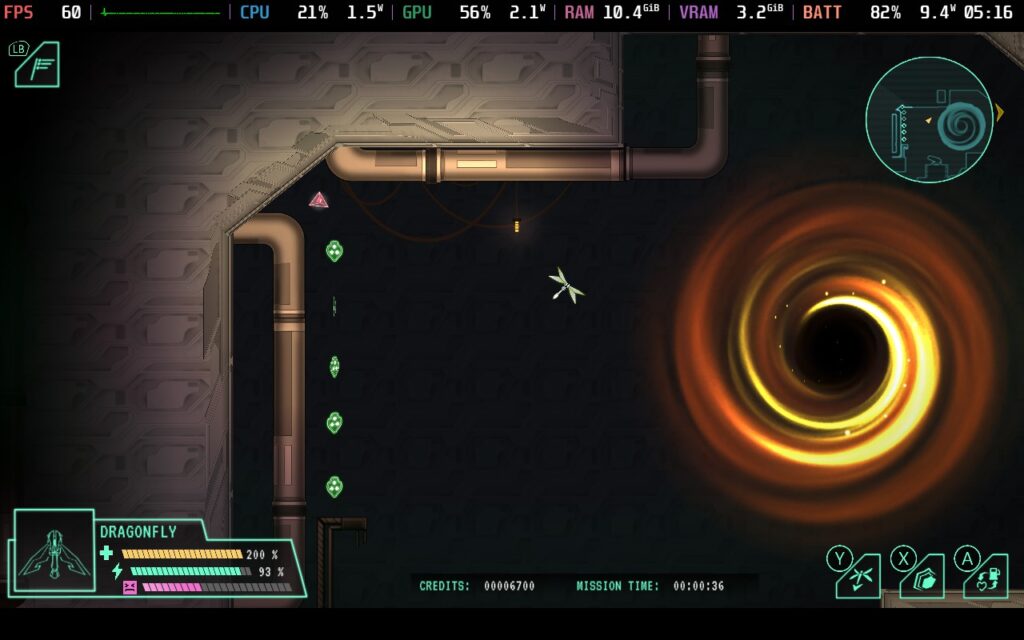
You can change vibration, language, and audio settings, but those are the only settings you can change in Lunar Lander Beyond.
There isn't any 16:10 resolution support, so there are black bars at the top and bottom, and there are cloud saves and gamepad support. There are no HDR settings.
Lunar Lander Beyond is a fantastic evolution of the Lunar Lander that makes the series more accessible without losing the difficulty. Adding a story and new gameplay elements, like the stress system, mix well with the beautiful art style to create a compelling experience that will be a treat for those who love the original or want to experience what they were missing from the older games. There aren't a lot of options other than the campaign, which meant replayability was out the window, and some missions can be a bit aggravating, but the story is enjoyable, and I had a great time playing through it.
The game plays extremely well on the Steam Deck, thanks to it being less intensive, and 60 FPS feels the best overall. It's a great experience, and I had a great time playing it portably.
Our review is based on the PC version of this game.
If you enjoyed this review, be sure to check out the rest of the content on SteamDeckHQ! We have a wide variety of game reviews and news that are sure to help your gaming experience. Whether you're looking for news, tips and tutorials, game settings and reviews, or just want to stay up-to-date on the latest trends, we've got your back.
Lunar Lander Beyond is a fantastic re-imagining of the original game, but it can feel a little barebones outside of the campaign. But, it runs well on the Steam Deck.
